牛津译林版八年级上册英语期末复习语法知识点总结汇编
译林版牛津初中英语八年级上册全册各单元知识点整理归纳

译林版初中英语八年级上册全册各单元知识点归纳整理译林版初中英语八年级上册Unit 1 Friends重点短语:1.一个诚实的男孩 an honest boy2.一个八年级的学生 a Grade 8 student3.一次写作比赛 a writing competition4.一则……的广告 an advertisement for5.保密keep secrets6.使我开心make me happy7.分享我的快乐share my joy8.遇到麻烦be in trouble9.和我一样苗条as slim as me10.一个我最好的朋友one of my best friends11.对……慷慨be generous to12.乐意做某事be willing/ ready to do13.给需要的人让座give seats to people in need14.环游世界travel around the world15.使他看起来聪明make him look smart16.感到无聊feel bored17.讲滑稽的笑话tell funny jokes18.走过课桌walk past the desk19.撞翻我的书knock over my books20.想起我的好朋友think of my good friends21.看一则广告read an advertisement22.一位忠实的朋友an honest friend23.及肩的头发shoulder-length hair24.做大量的电脑工作do much computer work25.投票赞成某人vote for sb.26.帮助有需要的人help people in need27.课外活动after-school activities28.尽力帮助他们try to help them29.一名社会工作者 a social worker30.未来计划future plans31.看起来爱好运动look sporty32.搬迁到北京move to Beijng33.过来come over34.想念我的老同学miss my old classmates35.与……交朋友make friends with36.给我一些忠告give my some advice37.住在隔壁live next door38.邀请某人做某事invite sb to do39.她微笑的眼睛her smiling eyes40.面带微笑wear a smile on one’s face41.再来一些饮料some more drinks42.一些喝的something to drink43.任何时间at any time44.在将来in the future45.对……很了解know sth. very well46.一个人坐着sit alone47.认识某人get to know sb.48.不如not as… as49.在做某事上有困难have problems doing sth.50.在某事上有困难have problems with sth.51.适合某事be suitable for52.和某人分享某物share sth with sb53.对某人友好be friendly to sb54.十年前ten years ago55.解出数学题solve the maths problem56.写信给某人write to sb57.说某人的坏话say a bad word about sb58.相信他说的话believe what he said/ his words59.倾听人们的难题listen to people’s problems60.帮助人们解决难题help people solve their problems61.因为……而出名be famous for62.作为……而出名be famous as63.个像艾伦那样的朋友have a friend like Alan64.在午餐期间during lunch time65.同意做某事agree to do66.同意某人的意见agree with sb67.在左边的那个男孩the boy on the left68.跑步最快的人the fastest runner69.A和B都both A and B重点句型:1.冰箱里没有别的东西。
牛津译林版八年级上册8A英语期末复习各单元语法知识点提纲
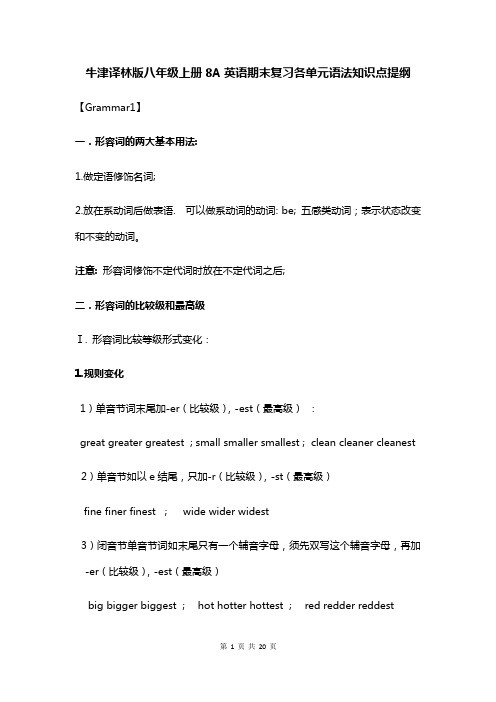
牛津译林版八年级上册8A英语期末复习各单元语法知识点提纲【Grammar1】一.形容词的两大基本用法:1.做定语修饰名词;2.放在系动词后做表语. 可以做系动词的动词: be; 五感类动词;表示状态改变和不变的动词。
注意:形容词修饰不定代词时放在不定代词之后;二.形容词的比较级和最高级Ⅰ. 形容词比较等级形式变化:1.规则变化1)单音节词末尾加-er(比较级),-est(最高级) :great greater greatest ; small smaller smallest ; clean cleaner cleanest 2)单音节如以e结尾,只加-r(比较级),-st(最高级)fine finer finest ; wide wider widest3)闭音节单音节词如末尾只有一个辅音字母,须先双写这个辅音字母,再加-er(比较级),-est(最高级)big bigger biggest ; hot hotter hottest ; red redder reddest4)以辅音字母+y结尾的词,则变y为-i,再加-er和-est。
easy easier easiest ; busy busier busiest5)部分双音节和多音节词在前面加单词more和most。
Careful more careful most carefulDifficult more difficult most difficult2.不规则变化good/well better best bad/ill worse worstmany/much more most little less leastfar farther/further farthest/furthest注:有些形容词一般没有比较等级。
如: right, wrong等。
三. 形容词比较级的用法:表示两者(人或物)的比较。
⒈表达“A大于B”用 A …比较级+than B①. Tom比我胖。
牛津译林版八年级上册(1——8单元)期末必考知识点复习

牛津译林版八年级上册(1——8单元)期末必考知识点复习Unit 1 知识点复1.可以使用 XXX 表示“一些喝的/吃的东西”。
2.使用数字+more = another+数字,如 XXX apples,表示“再来些……”。
3.honest 表示“诚实的”,XXX 表示“不诚实的”。
4.使用 keep a secret = keep secrets 表示“保守秘密”,keep a diary = keep diaries 表示“记日记”。
5.使用 share my joy 表示“分享我的快乐”(joy 不可数)。
6.表示“做某事有困难”可以使用 have problems (in) doing sth。
have trouble (in) XXX。
have difficulty (in) XXX。
7.使用 XXX what he says = XXX his words 表示“相信他所说的话”。
8.XXX 表示“谎言”,可以使用 tell XXX 表示“说谎”,tell stories 表示“讲故事”,tell jokes 表示“讲笑话”。
动词 lie 的过去式为 lay,过去分词为 lain。
9.interesting 修饰物,表示“令人感到有趣的”;interested修饰人,表示“对……感兴趣的”。
例如:That interesting old man came to our school every day.(那个有趣的老人天天到我们学校来。
)An XXX.(一位感兴趣的外国人来参观我们学校。
)This book is XXX.(这本书在我看来很有趣。
)I’m XXX book.(我对这本书很感兴趣。
)1) Good friends should not only be kind and supportive。
but also XXX。
2) Max is such an intriguing person.3) XXX is also one of the XXX class.4) My sister has short hair。
牛津译林版八年级上册英语 Unit 1-Unit 8 语法知识点总结汇编
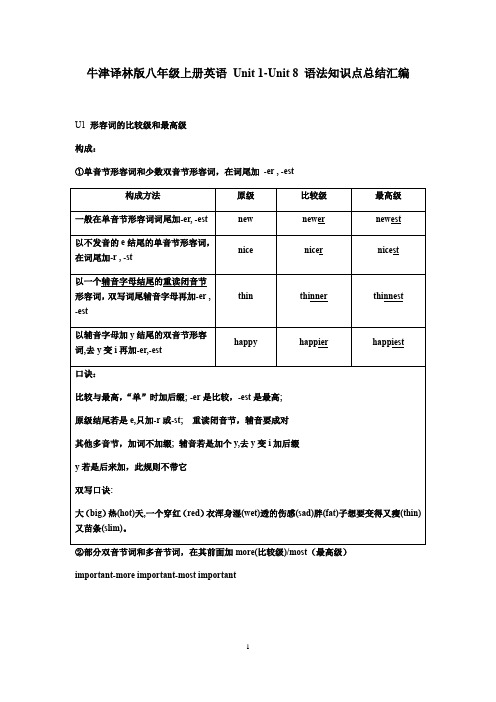
牛津译林版八年级上册英语Unit 1-Unit 8 语法知识点总结汇编U1 形容词的比较级和最高级构成:①单音节形容词和少数双音节形容词,在词尾加-er , -est②部分双音节词和多音节词,在其前面加more(比较级)/most(最高级)important-more important-most important③不规则变化形容词比较级的用法:形容词最高级的用法★最高级和比较级同义句转换:Li Lei is the tallest student in his class.=Li Lei is taller than any other student/the other students/the others in his class.►形容词最高级前若有不定冠词a 表示“非常”Spring is a best season.春天是一个非常好的季节。
U2 ◎数量的比较一、两者数量的比较1.用“more... than. . .”结构表示“...比...多”,more+可名复/不可名。
You have more books than I.你的书比我的多I have more free time than you.我的空余时间比你的多。
2.用“fewer/less... than..."结构表示“......比....少”,fewer+可名复,less+不可名。
Our school has fewer weeks off for the summer holiday than yours.我们学校比你们学校的暑假少放几个星期。
He spends less money on clothes than I.他在衣服上花的钱比我少。
二、三者或三者以上的数量上的比较1.用“the most”表示“最多”,most+可名复/不可名We study the most subjects of all.在所有人当中我们学习的科目最多。
牛津译林版八年级上册全册易错知识点期末复习
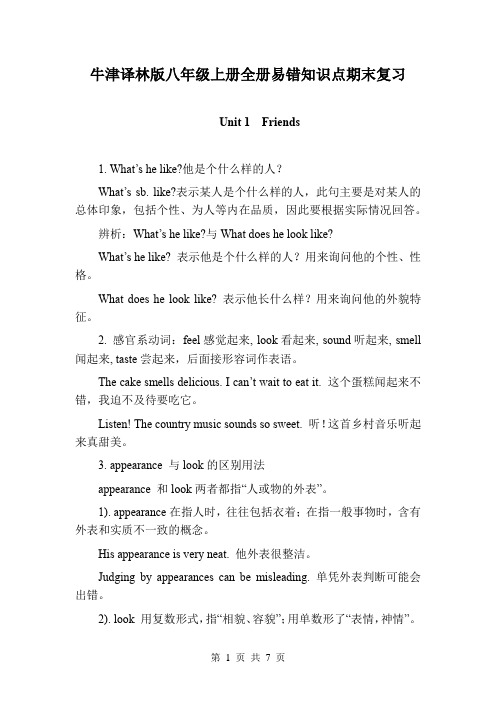
牛津译林版八年级上册全册易错知识点期末复习Unit 1 Friends1. What’s he like?他是个什么样的人?What’s sb. like?表示某人是个什么样的人,此句主要是对某人的总体印象,包括个性、为人等内在品质,因此要根据实际情况回答。
辨析:What’s he like?与What does he look like?What’s he like? 表示他是个什么样的人?用来询问他的个性、性格。
What does he look like? 表示他长什么样?用来询问他的外貌特征。
2. 感官系动词:feel感觉起来, look看起来, sound听起来, smell 闻起来, taste尝起来,后面接形容词作表语。
The cake smells delicious. I can’t wait to eat it. 这个蛋糕闻起来不错,我迫不及待要吃它。
Listen! The country music sounds so sweet. 听!这首乡村音乐听起来真甜美。
3. appearance 与look的区别用法appearance 和look两者都指“人或物的外表”。
1). appearance在指人时,往往包括衣着;在指一般事物时,含有外表和实质不一致的概念。
His appearance is very neat. 他外表很整洁。
Judging by appearances can be misleading. 单凭外表判断可能会出错。
2). look 用复数形式,指“相貌、容貌”;用单数形了“表情,神情”。
Never judge a man by his looks. 不要以貌取人。
There was a look of suppressed anger on his face. 他脸上露出一种抑制怒气的表情。
Unit 2 School life1. another泛指(指三者或三者以上中的)另一个,既可作代词又可作形容词.做代词时如:I have finished this book, please give me another. 做形容词:I will be back in another ten days.2. other其他的,另外的,泛指另一个另一些。
牛津译林八年级英语上册期末复习语法讲解(无)

一、法-形容和副的比(一)形容的比等(1)—用法解大部分的形容都有三个:原、比、最高。
此中比表示“更⋯⋯”,用于二者之的比,用来明“前者比后者更⋯⋯”,比前方一般用much, even, a little修,此中even, much 只好修比。
最高表示“最⋯⋯”,用于三者及三者以上之的比,用来明“某人或某物在某个范内最⋯⋯”①形容的比(-er)和最高 (-est)的组成a. 化之口:直接加;去 e 加;双写加;着加b. 不化原比最高good / well better bestbad / ill worse worstmany / much more mostlittle less leastfar farther, further farther, furtherold older, elder oldest, eldest② 形容的比和最高的组成及用法③ 比前的修a bit ; much, a lot, far,still, even, any, quite(a bit), almost, nearly, just, rather ; a little, many;twice, ten times, one fourth, two pounds, three years【小牛刀】1. I can't run any ____________(far). Shall we stop for a while?2. It is not so(hot) today as it was yesterday,3. ______________ (hard) you study, __________ __ (good) you will be at English.4.--Which do you like ____________ (well), English, Maths or Chinese?--English is my favorite subject.5. Our country is becoming _______________ and ________________ (beautiful).(二)形容的比等(2)—常句型①A=B A+ V + as + adj./adv. + as + B(与。
牛津译林版八年级英语全册语法知识点总结

8A语法Unit 1 Friends形容词比较级和最高级的变化规则1.规则变化:(1)一般形容词+er +est (shorter, smaller, smallest )(2)以e 结尾的形容词+r +st (nicer, larger, largest)(3)以辅音字母加y 结尾的形容词变y 为i 再+er, est (busier, busiest; heavier, heaviest),一个穿红big)热(hot)天(4)以重读闭音节结尾的形容词双写辅音字母+er, est 熟记:大()thin)又苗条(slimsadwet)透的伤感()胖(fat)子想要变得又瘦((red)衣浑身湿( 2.不规则变化(1)good(well)-better-best(2) many(much)-more-most(3)ill(bad, badly)-worse-worst(4) far-farther (further)-farthest (furthest)(5) little-less-least(6) few-fewer-fewest多音节的形容词比较级和最高级在词前加more , most 3. popular-more popular-the most popular delicious-more delicious-the most delicious可省略the, 而副词的最高级前the 形容词的最高级前必须有注意: 1. 比较级前常用a bit, a little, much, a lot, even, far 等词表示程度2.较三者或形容词最高级用来比than; 3.形容词比较级用来比较两者(人或事)句中常有短语表示比较范围. 句中常有in 或of (三者以上人或事),------) 不如------,不及------) / not as/so +adj.+ as (4. as+adj.+as (和------一样Unit 2 School life一、比较事物的数量----more ----most 修饰不可数名词)修饰可数名词)/1.many (much ( 数量多……比+ than ……不可数名词/ 可数名词复数more +e.g. I have more friends than you.2.few (修饰可数名词) ----fewer----fewestlittle (修饰不可数名词)----less----leastfewer +可数名词复数+ than ……比……数量少e.g. There are fewer boys than girls in our class.less + 不可数名词+than ……比……数量少e.g. I spend less money on food than my sister.3.the fewest +可数名词复数在……中最少He has the fewest books.4.the least +不可数名词在……中最少She has the least money of us.5.the most + 可数名词复数/ 不可数名词最多Daniel has the most money.二、副词的比较级和最高级(构成方法及用法与形容词基本相同)1.一般在词尾直接加er或est,例如,hard-harder-hardest fast-faster-fastest loud-louder-loudest2、部分双音节词和多音节词分别在原级前加more构成比较级和most构成最高级,例如:slowly-more slowly-most slowly clearly-more clearly-most clearlycarefully-more carefully-most carefully3、副词比较级和最高级的不规则变化well-better-best badly-worse-worstfar-farther/further-farthest/furthestUnit 3 A day out一、as…as的用法表示A与B在某一方面程度相同或不同时用形容词/副词原级。
牛津译林版八年级上册全册语法知识点复习总结

牛津译林版八年级上册全册语法知识点复习总结一、形容词的比较级和最高级1. 形容词的比较级用于两个人或事物之间的比较,其结构如下:主语+谓语动词(系动词)+形容词比较级+than+比较对象。
2. 形容词最高级的由用法:形容词最高级用于三者或三者以上的人或物进行比较,其结构为:主语+谓语动词(系动词)+the+形容词最高级+名词+表示范围的短语或从句。
3. 形容词的比较级和最高级是在形容词原级的基础上变化的,分为规则变化和不规则变化。
①规则变化①不规则变化二、比较事物的数量1. 两者之间比较通常用more..than/ less... than 和fewer..than来比较两种事物之间的数量关系。
其中more... than之间加可数名间的复数形式或者不可数名词,less... than 之间加不可数名词,fewer...than 之间加可数名词的复数形式。
例:I has more apples than Lily.我的苹果比莉莉的多。
He eats less food than I for breakfast.他早饭比我吃得少。
Bobby has fewer books than Tim.波比的书比蒂姆的少。
2. 三者或三者以上比较通常用the most、the least、the fewest 来比较三者或三者以上事物之间的数量关系。
the most、the fewest、the least 分别是many/much、few、little 的最高级。
the most 表示“最…;最多”,其后既可接可数名词又可接不可数名词;the fewest 表示“最少”,其后接可数名词的复数形式;the least 表示“最少”,其后接不可数名词。
例:Jack gets the most points of the three boys.在三个男孩中,杰克的得分是最高的。
He has the least milk among them. 他的牛奶是他们之中最少的。
牛津译林版八年级上册8A英语期末复习各单元语法知识点提纲

牛津译林版八年级上册8A英语期末复习各单元语法知识点提纲【Grammar1】一.形容词的两大基本用法:1.做定语修饰名词;2.放在系动词后做表语. 可以做系动词的动词: be; 五感类动词;表示状态改变和不变的动词。
注意:形容词修饰不定代词时放在不定代词之后;二.形容词的比较级和最高级Ⅰ. 形容词比较等级形式变化:1.规则变化1)单音节词末尾加-er(比较级),-est(最高级) :great greater greatest ; small smaller smallest ; clean cleaner cleanest 2)单音节如以e结尾,只加-r(比较级),-st(最高级)fine finer finest ; wide wider widest3)闭音节单音节词如末尾只有一个辅音字母,须先双写这个辅音字母,再加-er(比较级),-est(最高级)big bigger biggest ; hot hotter hottest ; red redder reddest4)以辅音字母+y结尾的词,则变y为-i,再加-er和-est。
easy easier easiest ; busy busier busiest5)部分双音节和多音节词在前面加单词more和most。
Careful more careful most carefulDifficult more difficult most difficult2.不规则变化good/well better best bad/ill worse worstmany/much more most little less leastfar farther/further farthest/furthest注:有些形容词一般没有比较等级。
如: right, wrong等。
三. 形容词比较级的用法:表示两者(人或物)的比较。
⒈表达“A大于B”用 A …比较级+than B①. Tom比我胖。
整理牛津译林版八年级上册英语知识点归纳
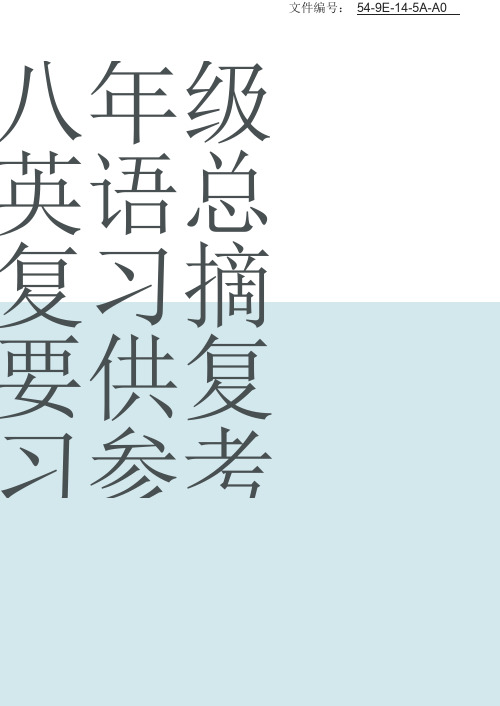
八年级英语总复习摘要供复习参考八年级英语总复习摘要(供复习参考)(语法部分)一、词汇词汇学习是英语学习的重要部分,掌握一定量的词汇是我们进行口头和笔头交际的基础。
词汇试题的主要测试内容为词语释义、词形转换和词语辨析等等,要求考生既要掌握基本词汇的意义,又要有运用词汇的基本能力,达到语言交际的目的。
(一) 词形转换1、名词的复数形式。
(1)规则变化:一般直接在词尾加s:pen——pens; table——tables①以s、x、o、ch、sh结尾加es:bus——buses; watch——watches, 但radio, photo和stomach后只加s, zero后加es或s均可。
②辅音字母加y结尾的,把y改i加es;city——cities; party——parties③以-f; -fe结尾的,改成v加es:knife——knives; wife——wives, 但roof后只加s。
(2)不规则变化:foot——feet; man——men; child——children; mouse-mice2、形容词、副词的比较级等级的变化。
(1)规则变化:①单音节词和少数双音节词一般在词尾加er/ estsmall——smaller——smallest; clever——cleverer——cleverest②辅音字母+y结尾的,把y变成i加er / est:easy——easier——easiest; heavy——heavier——heaviest③词尾以一个辅音字母结尾的重读闭音节单词,双写该辅音字母加er/ est:big——bigger——biggest; hot——hotter——hottest④多音节词,在词前加上more/ most:slowly——more slowly——most slowly;interesting——more interesting——most interesting(2)不规则变化:good(well) ——better——best;many(much) ——more——most;little——less——least; bad (ill, badly) ——worse——worst;far——farther(further) ——farthest(furthest)4、基数词变序数词主要掌握1~12及20、21等的序数词的形式,其它序数词都是在基数词末尾加th,是有规律可循的。
牛津译林八年级上册英语期末复习重点知识
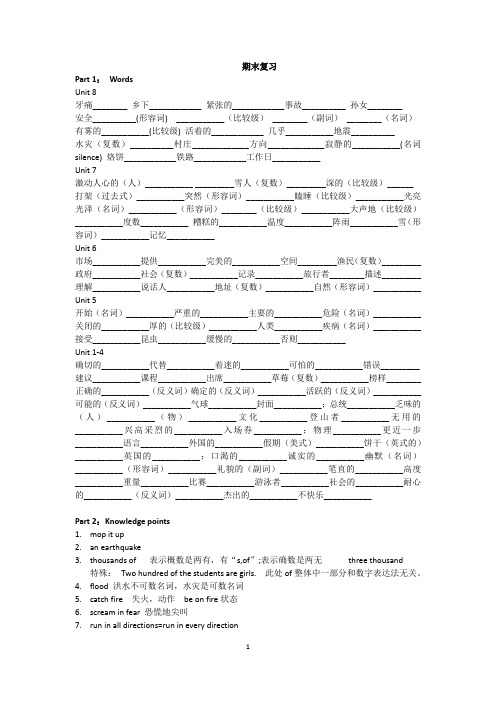
期末复习Part 1:WordsUnit 8牙痛________ 乡下____________ 紧张的____________事故__________ 孙女________安全__________(形容词) ___________(比较级)________(副词)________(名词)有雾的___________(比较级) 活着的____________ 几乎___________地震__________水灾(复数)__________村庄_____________方向_____________寂静的___________(名词silence) 烙饼____________铁路____________工作日___________Unit 7激动人心的(人)___________ _________雪人(复数)_________深的(比较级)______打架(过去式)___________突然(形容词)___________瞌睡(比较级)___________光亮光泽(名词)___________(形容词)________(比较级)___________大声地(比较级)___________度数___________ 糟糕的___________温度___________阵雨___________雪(形容词)___________记忆___________Unit 6市场___________提供___________完美的___________空间_________渔民(复数)_________ 政府___________社会(复数)___________记录___________旅行者________描述_________ 理解___________说话人___________地址(复数)___________自然(形容词)___________ Unit 5开始(名词)___________严重的___________主要的___________危险(名词)___________ 关闭的___________厚的(比较级)___________人类___________疾病(名词)___________ 接受___________昆虫___________缓慢的___________否则___________Unit 1-4确切的___________代替___________着迷的___________可怕的___________错误_________ 建议___________课程___________出席___________草莓(复数)___________榜样________ 正确的___________(反义词)确定的(反义词)___________活跃的(反义词)___________ 可能的(反义词)___________气球___________封面___________;总统___________乏味的(人)___________(物)___________文化___________登山者___________无用的___________兴高采烈的___________入场券___________;物理___________更近一步___________语言___________外国的___________假期(美式)___________饼干(英式的)___________英国的___________;口渴的___________诚实的___________幽默(名词)___________(形容词)___________礼貌的(副词)___________笔直的___________高度___________重量___________比赛___________游泳者___________社会的___________耐心的___________(反义词)___________杰出的___________不快乐___________Part 2:Knowledge points1.mop it up2.an earthquake3.thousands of 表示概数是两有,有“s,of”;表示确数是两无three thousand特殊:Two hundred of the students are girls. 此处of整体中一部分和数字表达法无关。
牛津译林版8上期末复习知识点汇总

Tips for the Mid-term exam一、单选1. 冠词\代词a 泛指a useful bookthe (1)特指the man in the mirror/the girl in blue(2)最高级(>=3) the slimmest in our classthe most important personHave the _____rice/the______ bananas(3)两者比较the prettier of the twins(只有of the two前加the +比较级)an honest/unhappy/active boyan American/eraser/instruction/example/exciting competition/earthquakean 11-year-old girl/ 不可数名词It is hard work/fun/useful advice/good news.p.s.1. it/one /that三者均可用作代词, 指代前面提到的名词。
一般说来, it指代同名同物; one 与that则指代同名异物。
I have lost my umbrella; I'm looking for____. (该句中it就是指前面的my umbrella)I have lost my umbrella; I think I must buy____. (one在该句中表泛指, 因为my umbrella 已经丢了)The umbrella you bought is cheaper than______ I bought. (替代词that在该句中特指“the umbrella I bought”, 以区别“the umbrella you bought”)2. one与that虽可用来指代同名异物, 但one为泛指, 相当于a/an+名词; that为特指, 相当于the +名词。
牛津译林版八年级英语上册全册知识点归纳总结
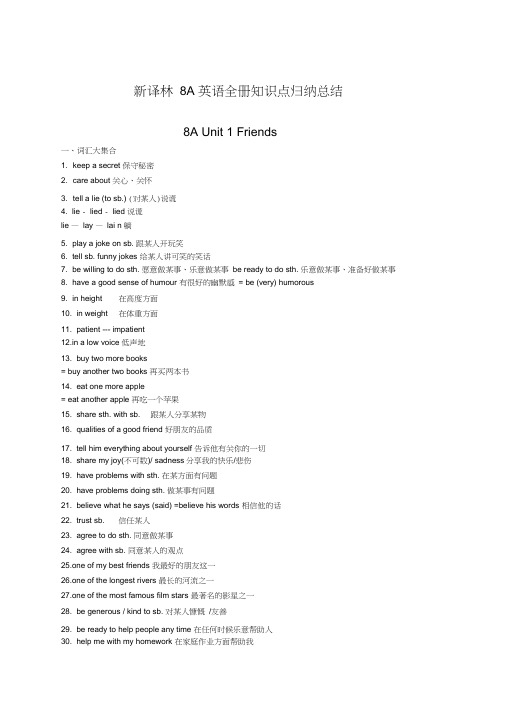
新译林8A 英语全册知识点归纳总结8A Unit 1 Friends一、词汇大集合1. keep a secret 保守秘密2. care about 关心、关怀3. tell a lie (to sb.) (对某人)说谎4. lie - lied - lied 说谎lie —lay —lai n 躺5. play a joke on sb. 跟某人开玩笑6. tell sb. funny jokes 给某人讲可笑的笑话7. be willing to do sth. 愿意做某事、乐意做某事be ready to do sth. 乐意做某事、准备好做某事8. have a good sense of humour 有很好的幽默感= be (very) humorous9. in height 在高度方面10. in weight 在体重方面11. patient --- impatient12.in a low voice 低声地13. buy two more books= buy another two books 再买两本书14. eat one more apple= eat another apple 再吃一个苹果15. share sth. with sb. 跟某人分享某物16. qualities of a good friend 好朋友的品质17. tell him everything about yourself 告诉他有关你的一切18. share my joy(不可数)/ sadness分享我的快乐/悲伤19. have problems with sth. 在某方面有问题20. have problems doing sth. 做某事有问题21. believe what he says (said) =believe his words 相信他的话22. trust sb. 信任某人23. agree to do sth. 同意做某事24. agree with sb. 同意某人的观点25.one of my best friends 我最好的朋友这一26.one of the longest rivers 最长的河流之一27.one of the most famous film stars 最著名的影星之一28. be generous / kind to sb. 对某人慷慨/友善29. be ready to help people any time 在任何时候乐意帮助人30. help me with my homework 在家庭作业方面帮助我31. give a seat on the bus to someone in need 在公交车上让座给有需要的人32. h ave a good/sweet voice 有个好 / 甜美的嗓音 33. w ear small round glasses 戴小小的圆框眼镜 34. m ake him look smart 使他看起来精干35. never feel bored with him 和他一起从不感到无聊 36. a boring film 一部无聊的电影37. make me thirsty 使我口渴 make sb. / sth.+adj. make me laugh 使我大笑 make sb. do sth. 38. walk past our desks=pass our desks 从我们桌子旁边经过 39. kn ock ...o nto the grou nd 把…撞到地上 knock over 撞翻 ,碰倒knock …off …把…从…上撞下来40. so interesting 如此有趣41. have big bright eyes 有双明亮的大眼睛 42. have/wear long straight hair 留长直头发 43. say a bad word about sb.=say bad things about sb. 说某人的坏话 44. a true friend一个真诚的朋友45. sth. worry sb. 某事困扰某人46. sb. be worried about sth. 某人担心某事47. choose sb. as /(to be) your best friend 选择某人作为你最好的朋友48. look smart in his small round glasses 戴着他的小圆框眼镜看起来帅 49.listen to people carefully 认真听人们倾诉50. help people with their problems 帮人们解决问题 51. make friends with sb. 跟某人交朋友 52. among the six students 在六名学生当中53. among all the Chinese artists 在所有的中国艺术家当中 54. talk about our future plans 谈论我们的未来计划 55. a small girl with a ponytail 一个扎马尾辫的女孩 55. a boy with / wearing glasses 一个戴着眼镜的男孩 56. both .... and ….. 既…又…57. b e/ make / become an excellent teacher 成为一名优秀的教师 58. feel bored or unhappy 感觉无聊或不开心59.like her bright smiling eyes 喜欢她明亮略带微笑的眼睛 60. w ear/have a smile on one 's face 面带微笑 二、句型大集合 1. Can I have something to drink? 2. Can I have some more food? 3. There is nothing in the fridge.冰箱里什么也没有。
牛津译林版八年级上册英语期末复习:各单元语法要点总结汇编

牛津译林版八年级上册英语期末复习:各单元语法要点总结汇编Unit1/unit2形容词、副词的比较级和最高级1、形容词、副词比较级和最高级词汇变化规则1)大多数短形容词(adj.)或副词(adv.)(单音节和少数双音节):直接加er est:long fast以e结尾的直接加r st:nice以“辅音字母+y”结尾的:去y+ier iest:easy以“一个元音+一个辅音字母”结尾的:双写辅音字母+er est (重读闭音节):big2)长形容词(两个以上):more+形/副most+形/副:important3) 不规则(死背)good/well :Bad/badly:many/much:little:far:2、形容词、副词比较级和最高级句型用法1)比较级:两者比较,“形容词或副词比较级+than”(根据上下文,than可以省略) E.g.Tom is much taller than Mary. (注意:much可以修饰比较级“......得多”)Tom runs faster than Mary.比较级正常没有the,特殊句型除外than后面主宾格问题:主语比较(且没有宾语),than后面没有谓语动词:主宾格都可(考试以学校老师的讲解为标准),但than后面出现谓语动词只能主格。
E.g. He is taller than she/her. He is taller than she is.He plays better than she/her.He plays better than she does.宾语比较只能宾格(试比较下面两句意思)E.g. He knows her better than I. 翻译He knows her better than me. 翻译2)最高级:三者及以上比较,the+最高级+(比较范围)可接序数词E.g. The building is the tallest in the country.The building is the second tallest in the country.注意in 和of的选择:E.g. She is the tallest of the three students.3、数量比较的四个形式多:more+名词+than, the most少:fewer/less+名词+than, the fewest/least这时不翻译成“更/最”,而要翻译成“更多或最多/更少或最少”注意比较差别:more students more beautiful4、同级比较(unit3)as...as “和......一样”否定:not as/so...as“不及,不如”=less+原级或反义词比较级+thanE.g. Mr Wu is as happy as the two girls.The two girls are not as tall as Mr Wu.=The two girls are shorter than Mr Wu. 根据形容词选择I think English is not so important as Chinese.=I think English is less important than Chinese.5、特殊用法1)固定句型形容词最高级前若有不定冠词a时,不表示比较,而表示“非常”之意:试比较下两句话:E.g. Spring is a best season.Spring is the best season.比较级+and+比较级(短)/more and more+原级(长)“越来越”E.g. better and better more and more beautiful(长单词不需要重复a.或adv.)两种情况同时变化“the+比较级,the+比较级”“越......越......”E.g. The older I get, the happier I feel.2)同义转换E.g. Li lei is the tallest student in his class.=Li lei is taller than any other student in his class.E.g. I think English is not so important as Chinese.=I think English is less important than Chinese.Less +a.原级+than仅用于长单词短单词要换反义词,见下E.g. The model bridge isn’t as tall as the real one.=The model bridge is shorter than the real one.Unit3 反身代词1、单词形式:注意单复数从我自己开始默写2、用法1)放动词或者介词后做宾语E.g. enjoy oneself do sth. by oneself2)做表语或同位语E.g. I am not myself today. 我今天不在状态The thing itself is not important.3)在不强调的情况下,but,except,for等介词后宾语用反身代词或人称代词宾格均可。
牛津译林版八年级上册英语知识点归纳(完整版)
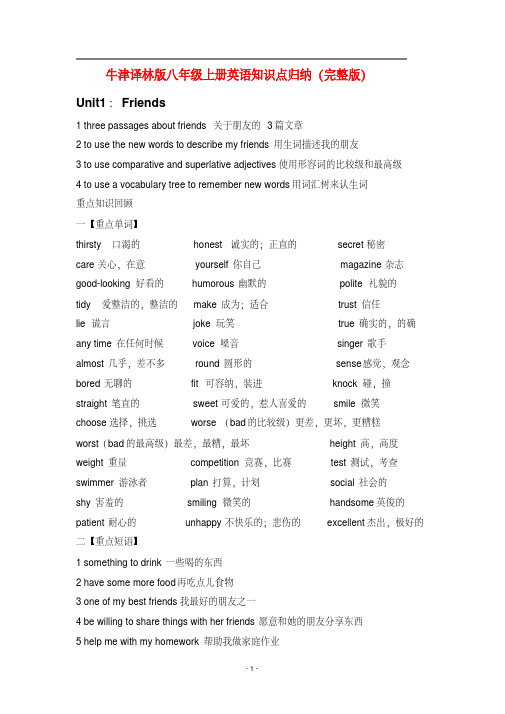
牛津译林版八年级上册英语知识点归纳(完整版)Unit1:Friends1 three passages about friends 关于朋友的3篇文章2 to use the new words to describe my friends 用生词描述我的朋友3 to use comparative and superlative adjectives 使用形容词的比较级和最高级4 to use a vocabulary tree to remember new words 用词汇树来认生词重点知识回顾一【重点单词】thirsty 口渴的honest 诚实的;正直的secret 秘密care 关心,在意yourself 你自己magazine 杂志good-looking 好看的humorous 幽默的polite 礼貌的tidy 爱整洁的,整洁的make 成为;适合trust 信任lie 谎言joke 玩笑true 确实的,的确any time 在任何时候voice 嗓音singer 歌手almost 几乎,差不多round 圆形的sense 感觉,观念bored 无聊的fit 可容纳,装进knock 碰,撞straight 笔直的sweet 可爱的,惹人喜爱的smile 微笑choose 选择,挑选worse (bad的比较级)更差,更坏,更糟糕worst(bad的最高级)最差,最糟,最坏height 高,高度weight 重量competition 竞赛,比赛test 测试,考查swimmer 游泳者plan 打算,计划social 社会的shy 害羞的smiling 微笑的handsome 英俊的patient 耐心的unhappy 不快乐的;悲伤的excellent杰出,极好的二【重点短语】1 something to drink 一些喝的东西2 have some more food 再吃点儿食物3 one of my best friends 我最好的朋友之一4 be willing to share things with her friends 愿意和她的朋友分享东西5 help me with my homework 帮助我做家庭作业6 give her seat on the bus to someone in need 在公共汽车上把她的座位让给有需要的人7 grow up 长大,成长8 make sb. look smart 是某人看上去聪明9 have a good sense of humour 有很强的幽默感10 tell funny jokes 讲有趣的笑话11 walk past our desks 经过我们的课桌12 knock…onto…把……撞到……上13 say a bad word about sb. 讲某人的坏话14 keep a secret 保守秘密15 travel around the world 环游世界16 both my neighbour and my best friend17 feel bored or unhappy 感到无聊或不快乐三【重点句型】1 There’s nothing in the fridge. 冰箱里没有东西2 He tells funny jokes and always makes me laugh. 他讲滑稽的笑话而且总是使我大笑。
牛津译林版八年级英语上册Unit1-3语法知识点归纳

牛津译林版八年级英语上册Unit1-3语法知识点归纳1、一般现在时1)一般现在时的形式主语为第三人称单数时,需在动词原形后加s或es:A. 多数动词后面加s。
如eat—eats, play—plays, swim—swims, walk—walks。
B. 以字母o, s, x, ch, sh 结尾的动词后面加es。
如do—does, go—goes, guess—guess, fix—fixes, teach—teaches, push—pushes。
C. 末尾为-y的动词分两种情况:a. 若-y前为辅音字母时,则将-y变为-i,再加-es。
如study—studies, fly—flies, cry—cries。
(-y前分别为辅音字母d, l, r。
)b. 如-y 前为元音字母时,则-y 不变,直接在-y后面加-s。
元音字母共五个。
它们是a, e, I, o, u。
如say—says, buy—buys, enjoy—enjoys。
(-y前分别为元音字母a, u, o。
)2) 一般现在时所表达的含义A. 永恒的真理或事实。
The sun comes out from the east. 太阳从东方升起。
Light travels faster than sound. 光速比声速快。
Cats eat fish. 猫吃鱼。
表述“现在时段”。
“一般现在时可用以陈述现在时段内发生或存在的事件、动作或情况。
这些事件、动作或情景说不定会无限地延续下去。
但实际上,我们的意思则是在说“这是现在存在着的状况”。
“My hair is very long. 我的头发很长。
Millie lives in Beijing. Millie住在北京。
His parents work in a supermarket. 他的父母亲在一家超市里工作。
B.有规律发生的动作一般现在时可用来表示习惯性动作,也就是指不断重复的事情。
牛津译林版八年级上册(1——8单元)期末必考知识点复习
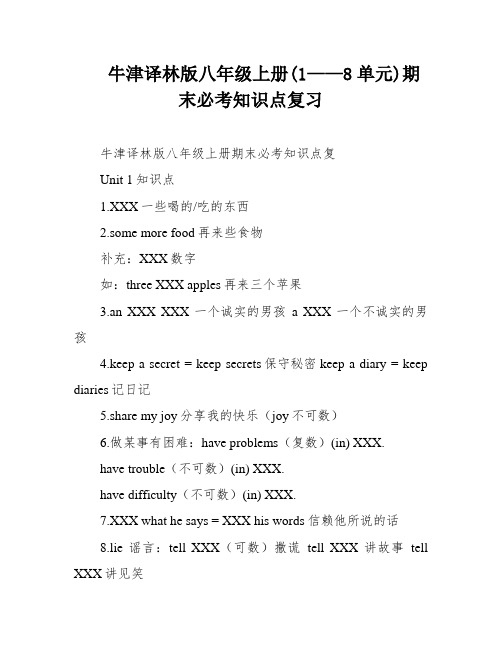
牛津译林版八年级上册(1——8单元)期末必考知识点复习牛津译林版八年级上册期末必考知识点复Unit 1知识点1.XXX一些喝的/吃的东西2.some more food再来些食物补充:XXX数字如:three XXX apples再来三个苹果3.an XXX XXX一个诚实的男孩a XXX一个不诚实的男孩4.keep a secret = keep secrets保守秘密keep a diary = keep diaries记日记5.share my joy分享我的快乐(joy不可数)6.做某事有困难:have problems(复数)(in) XXX.have trouble(不可数)(in) XXX.have difficulty(不可数)(in) XXX.7.XXX what he says = XXX his words信赖他所说的话8.lie谣言:tell XXX(可数)撒谎tell XXX讲故事tell XXX讲见笑liev.动词,躺lie ---lay--XXX9. interestedadj.感到有趣的,一般修饰人interesting adj.令人感到有趣的,一般修饰物interesting属内向性子的词,用于指人、事、物的外在影响方面,意为“使(外)人感乐趣的”;interested属内向性质的词,用于指人的内心感受方面,意为“(内心)对……感兴趣的”试比较:a)That interesting old man came to our school every day.那个有趣的老人天天到我们学校来。
(外在影响)b)An XXX.一位感兴趣的外国人来参观我们学校。
(内心感受)a)This book is XXX.这本书在我看来很有趣。
(外在影响)b)I’minterested in this book.我对这本书很感兴趣。
(内心感受)课本例句:1)I think good XXX(page7)(外在影响)2) Max is so interesting. (page8)(外在影响)10.one of +描述词最初级+名字复数如:one of my best XXX. has动词,“长着,”在句中作谓语动词;with介词,“长着,戴着”,在句中作定语wear动词,“衣着,戴着”,在句中作谓语动词;in介词,“衣着”,在句中作定语1)My sister has short hair.动词,长着,做谓语动词2)The girl with short hair is my sister.介词,长着,做定语,润饰the girl,不成用has,因为句中曾经有谓语动词is3)My sister wears small round glasses.4)The girl with small round glasses is my sister.课本例句:XXX(page14)(作定语)12.help sb. (to) do sth,XXX或人做某事XXX.13.be willing to do sth.= be ready to do sth.甘愿答应做某事;甘愿答应做干事14.give one’s seat on the bus to XXX在公交车上给需要的某人让座15.have a good voice嗓音甜美voice嗓音sound声音noise 噪音16.want to be想成为grow up长大17.have a (good) sense of humour = be (very) humorous (很)有诙谐感18.XXX(人)感到无聊的boring adj.(物)令人感到无聊的XXX感到XXX一场令人感到无聊的足球赛19.walk past走着颠末past介词动词+pastpass动词(及格;通过)21.say a bad word about sb.说某人的坏话①say to oneself自言自语;②speak +语言;打电话;作演讲XXX.④tell sb sth.;tell sb. (not) to do sth.;XXX讲故事/讲见笑/撒谎22.true adj.正确的,实在的truly adv.(副词)truth n.本相,谬误,究竟23.XXX.某人担心某事/某人XXX(worries三单/worried过去式) sb.某事让或人忧郁如:XXX.(something不定代词做主语,谓语动词用三单)24.look smart in his small round glasses戴着圆圆的小眼镜让他看起来很神气sb. look +adj.+in sth. = sth. look +adj.+on sb.26.make XXX和某人交朋友27.XXX当真地听或人发言careful adj.认真的,仔细的adv.carefully<反> XXX粗心的adv.carelessly28.travel around the world环游世界29.be kind to sb.对某人很好be friendly to sb.对某人友好的30.an artist一位艺术家XXX XXX.插手或人做某事33.be both/ be all(both/all放be动词后)XXX n.笑容XXX笑容的smiling eyesXXX面带微笑35.patientn.病人adj.有耐心的<反> XXX没有耐心的,急躁的an XXX36.make an XXX成为一位优良的教师37.形容词中比较级和最高级需要双写最后一个字母,再加er/est的词语口诀:大(big)热(hot)天,一个穿红(red)衣满身湿(wet)透的伤感(sad)胖(fat)子想要变得又瘦(thin)又修长(slim)38.what be sb.like ?问或人的长相或品格what do(does) sb. look like?仅询问某人的长相what do(does) sb. like?问某人喜欢什么39.luckn.运气Good luck to you.祝你好运。
- 1、下载文档前请自行甄别文档内容的完整性,平台不提供额外的编辑、内容补充、找答案等附加服务。
- 2、"仅部分预览"的文档,不可在线预览部分如存在完整性等问题,可反馈申请退款(可完整预览的文档不适用该条件!)。
- 3、如文档侵犯您的权益,请联系客服反馈,我们会尽快为您处理(人工客服工作时间:9:00-18:30)。
牛津译林版八年级上册英语期末复习语法知识点总结汇编I.形容词/副词比较级与最高级
[定义]
两者比较,要用比较级,通常than引出比较的对象;三者及三者以上比较用最高级,此时通常会有比较的范围或者群体。
[构成]
①规则变化
②不规则变化
[精华提点]
1.A.....than B的句型
than是比较级的标志词,也是单选题和单词拼写题的字眼。
①Jack is ________than Tom.
A .tall B. taller C.the taller D.the tallest
①Now I have_______(多)homework than before.
2.of the two的结构中形容词的比较级前须要有定冠词the.
He is the shorter of the two.
3.形容词比较级前用不定冠词表示类指,翻译成“一个......”。
-How do you like the movie we saw yesterday?
-Wonderful.I have never seen a better movie than this one.
4.any other+名词单数与any+名词单数的区别
any other+名词单数表示比较的两个对象在同一个范围,此时可以用the other+名词复数和the rest of+名词复数替换。
Suzhou is larger than any other city in Jiangsu.
=Suzhou is larger than the other cities in Jiangsu.
=Suzhou is larger`than the rest of the cities in Jiangsu.
any+名词单数表示比较的对象不再同一个范围内。
China is bigger than any country in Africa.
Shanghai is more beautiful than any city in Japan.
5.one of +adj(est)+名词复数
China is one of the most beautiful countries in the world.
6.形容词比较级前的修饰语
a little / a bit / a little bit / any / no/ far / by far/ even/ much/
①even和much只可以修饰形容词或副词的比较级。
The weather in Suzhou is even______(热).
This time I did much______(差)in sports.
[误区指引]
I think Suzhou is __________than Guangzhou.
A.more cold
B.much colder
C.more colder
D.much more cold
2.China is________than Japan.
A.much beautiful
B.much more beautiful
C.more beautifuler
D.more much beautiful
7.指示代词在比较级中的考点
The weather in Beijing is better than that in Tianjin.
The book on the desk is much more interesting than that/the one in the drawer.。
